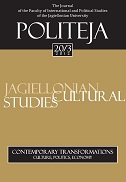EU Citizens or Eastern European Labour Migrants? The Peculiar Case of Central Eastern Europeans in Britain
EU Citizens or Eastern European Labour Migrants? The Peculiar Case of Central Eastern Europeans in Britain
Author(s): Zinovijus CiupijusSubject(s): Social Sciences
Published by: KSIĘGARNIA AKADEMICKA Sp. z o.o.
Keywords: UE; Schengen Agreement; free movement of people; market access
Summary/Abstract: The text is developed on the basis of the research conducted among immigrants from Central and Eastern Europe (Poland, Slovakia, Estonia, Latvia, and Lithuania). Based on the interviews with immigrants the author tries to reconstruct the reception of immigrants by the host society indicated by the degree of access to tangible and symbolic goods (e.g. work, social protection, prestige, etc.) The Schengen Agreement introduced free movement of people between most but not all states of the European Union. Depending on the country of origin, it resulted in differentiation between migrants who can move freely and those who are denied such unrestricted movement across the EU. Such divide can be seen not only in the sphere of freedom of movement but also in the sphere of awarding and not awarding individuals with certain goods and privileges.
Journal: Politeja - Pismo Wydziału Studiów Międzynarodowych i Politycznych Uniwersytetu Jagiellońskiego
- Issue Year: 9/2012
- Issue No: 20-3
- Page Range: 29-46
- Page Count: 18
- Language: English

